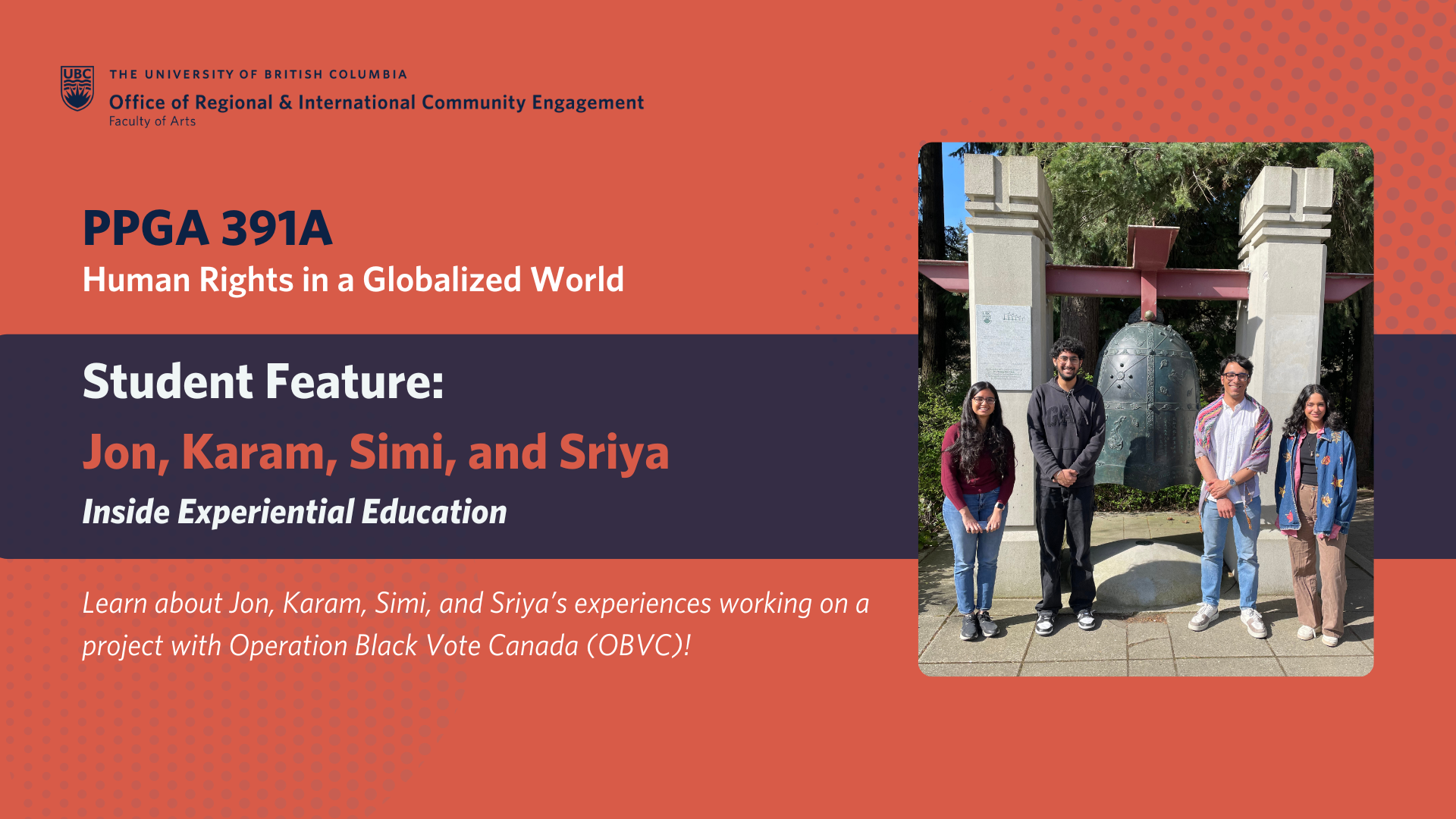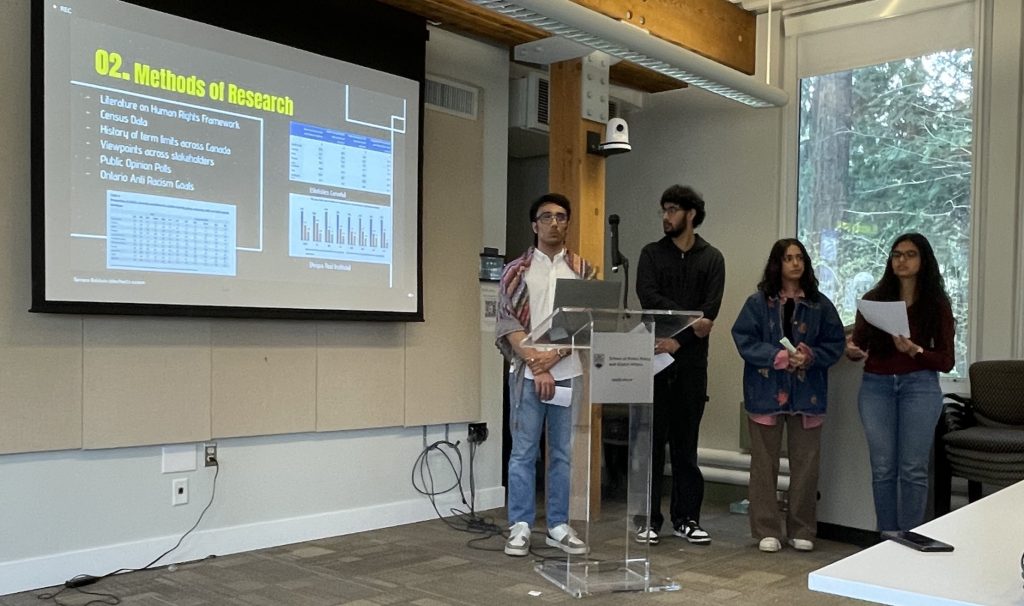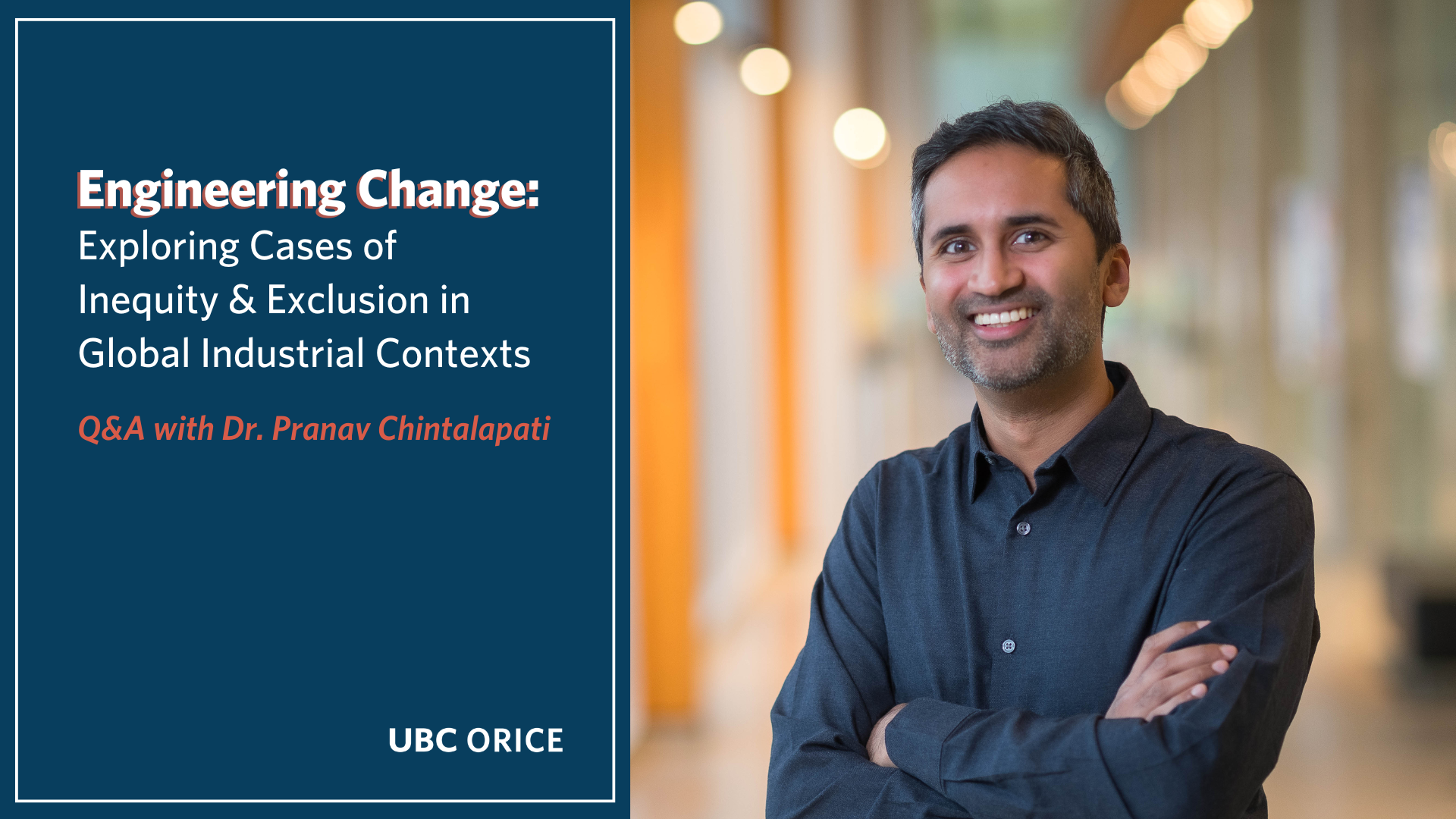

During the 2023 Winter Session, the School of Public Policy and Global Affairs piloted a new interdisciplinary undergraduate course in collaboration with the UBC Human Rights Collective and the UBC Office of Regional and International Community Engagement. PPGA 391A: Human Rights in a Globalized World: Interdisciplinary Perspectives and Practical Applications offered undergraduate students a unique opportunity to gain hands-on experience in human rights work through community-partner group projects.
To better understand the value of this experiential learning component, we interviewed Jon, Karam, Simi, and Sriya, a group of students who worked on a community partner project with Operation Black Vote Canada (OBVC). We also interviewed Velma Morgan, the chair of OBVC, to understand the perspectives of both the students and the community partner. Operation Black Vote Canada is a non-profit, multi-partisan organization that seeks to increase the participation and representation of Black Canadians in politics at all levels through education, motivation, and advocacy.
Jon, Karam, Simi, Sriya, and Velma join us for a Q&A to discuss the value of experiential education and their experiences collaborating on a project!
Why were you interested in taking a course with an experiential learning component?
Sriya: It was very interesting to learn about the different community partners involved in the experiential learning component of the course. It was intriguing to see how our values and what we learned aligned with their projects. So, it felt good to contribute to their objectives.
Jon: We all know that political science and IR-related courses are very theoretical. Therefore, actually working in society and getting that experience to apply what we’re learning to the real world is very rewarding. I was in a course last semester with an experiential learning component, and I felt like it was a great way to learn. So yeah, I wanted to try it again.
“Actually working in society and getting that experience to apply what we're learning to the real world is very rewarding”
Karam: As Jon mentioned, political science and IR involve a lot of theoretical work. They also require a lot of hands-on work, typically done by people with years of experience. So, it was intriguing for me, an undergraduate student, to work first-hand on a real-life advocacy project.
Simi: I completely agree. Going into this course, I wasn’t sure what advocacy could look like outside of a classroom. So, getting that hands-on experience piqued my interest in it. This is the first course I’ve taken with an experiential learning component, adding another level of interest.
Can you provide a brief overview of Operation Black Vote Canada and the specific project the PPGA 391A students worked on?
Velma: Operation Black Vote Canada is dedicated to increasing the representation of Black Canadians in the political process across Canada at all orders of government. We host workshops, events, and training for Black Canadians.
Simi: Our project addressed the racial disparity and underrepresentation within municipal offices, specifically in Ontario. As our research developed, we found that a two-pronged approach was needed to increase representation: term limits and civic education or candidate preparation. Our task was to create a report and a two-page brief centred around this.
Why was student involvement in this project important?
Velma: Since they were in the university space, the students were well-equipped to conduct research from a human rights perspective. They brought a fresh perspective to the project, which was good for several reasons. Since they are younger, the findings of their research will impact not necessarily them because they’re in BC, but people their age in Ontario, in future elections. So we thought that by having students engage directly with issues of political representation and civic engagement, we could get a clear or different view on this particular subject.
“We thought that by having students engage directly with issues of political representation and civic engagement, we could get a clear or different view on this particular subject”

Jon, Karam, Simi, and Sriya presenting their project with OBVC to the PPGA 391A class.
What was the most challenging part of working on this project?
Sriya: Early on, we had difficulty finding the correlation between implementing term limits and increasing diverse representation, which was our original guideline. This made it difficult to start, but as the project developed, we went past the literature review stage and examined different data types. This included using census data and assessing how provinces across Canada structure municipal term limits. Having conversations with the teaching staff and Velma when needed also helped us adjust our approach to the project.
“Having conversations with the teaching staff and Velma when needed also helped us adjust our approach to the project.”
Jon: Our starting point was to assess the diversity of local municipal councils and determine which communities were adequately represented in proportion to their population size. This information is limited, and if it’s available, it’s often blocked behind a paywall or memberships reserved for certain organizations. This is concerning because these are political realities of Canada’s democratic process, yet the important data does not exist or is simply unavailable to the public.
Velma: From my perspective, one of the challenges the students faced was being outside of Ontario. They wouldn’t know the nuances of what’s happening in Ontario regarding government. So they would have to do some research just to figure out what the Ontario government is all about. I guess the second challenge the students faced was positionality. Except for one student of mixed race, the other group members were not Black. Therefore, in trying to work with a Black organization on an issue of Black representation, they had to put aside whatever biases or lived experiences they had and try to figure out how to work together as a group, but also to work with the challenge of trying to bring this forth to government.
Can you share a key lesson or insight you learned that you might not have in a traditional classroom setting?
Karam: When I started the project, I thought writing a report would be relatively straightforward. However, I quickly learned that there’s a big distinction between a research paper you might write for a class versus something you produce for a community partner organization. Even though the bulk of our focus was on writing and gathering information from secondary sources, the project had more to do with practical applications to the real world. It isn’t just a matter of reproducing that same information in different words with some analysis, it is about applying this information and thinking about what realistic recommendations and findings we can provide for the community partner. This is usually absent from a traditional classroom setting, which emphasizes theory over practical application.
“I quickly learned that there’s a big distinction between a research paper you might write for a class versus something you produce for a community partner organization. Even though the bulk of our focus was on writing and gathering information from secondary sources, the project had more to do with practical applications to the real world.”
What skills did you develop or enhance through your participation in this project?
Simi: Personally, the skill I developed the most was project management. When given a project, there’s usually a base guideline to give you a starting point. However, with this project, I found that Velma gave us full reign to take the project wherever we saw fit. So our only guideline was to produce a report or a 2-page brief. Entirely deciding where to start and how to arrange the steps toward a finished product was something I had never done before.
Beyond this, the basic communication and collaboration skills we developed throughout the project were valuable. Between all four of us and Velma, our schedules were very busy. However, due to the pre-planning and our team agreement, we became very efficient at finding time in our schedules throughout the project. This was the best group project I’ve ever done because we developed a strong communication plan early on.
“Personally, the skill I developed the most was project management…This was the best group project I’ve ever done because we developed a strong communication plan early on.”
This interview was conducted by HRC program assistants Noah Stuart and Emma Villalobos. If you are interested in PPGA 391A and other experiential education courses, follow UBC HRC on Instagram and subscribe to our Newsletter for updates on future opportunities!
About the Students
Jon Gill (he/him)


Jon is a recent graduate of International Relations and Middle East Studies at UBC. He is interested in migration and refugee issues, particularly how societies and states shape identities in relation to migration through policy. He has focused on varying migratory contexts, including in the contemporary Mediterranean region and historical Black American migration.
Karam Singh Sikand (he/him)


Karam is a fourth-year International Relations and History minor from New Delhi, India. He particularly enjoys studying and focusing on the interplay between Human Rights and policy in South Asia. His study interests revolve around democracy and democratic processes in South Asia in general.
Simi Sahota (she/her)


Simi is in her second year majoring in Political Science. This major, coupled with her own experiences, has led to her interest in change-making, particularly around advocacy and policy.
Sriya Srivastava (she/her)


Sriya Srivastava is majoring in International Relations with a minor in Economics. Her passion for pursuing a focus on International Development and Trade stems from living in several Asian countries and understanding the interconnected political and economic systems. This experience working with OBVC has reinforced her passion for promoting human rights and making a positive impact globally.
About the Community Partner Representative
Velma Morgan (she/her)


Velma Morgan is the chair of Operation Black Vote Canada. She has experience creating and implementing public policies and programs in the Ontario provincial government. Her comprehensive knowledge of government and public policy processes allows her to quickly decipher and analyze complex issues and positively contribute to a solution.


